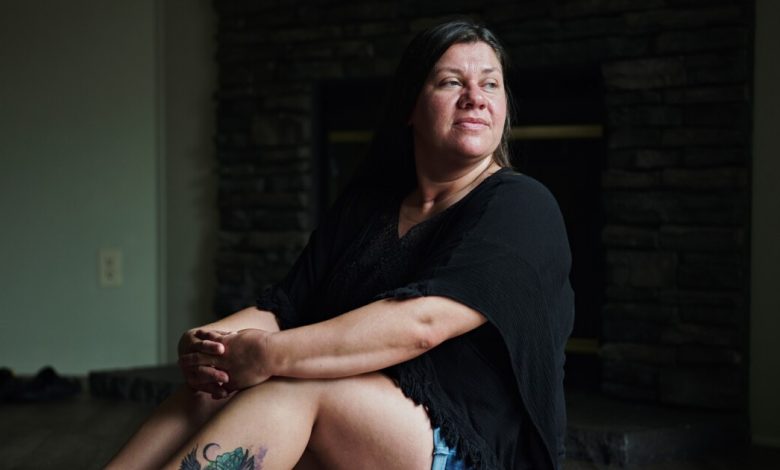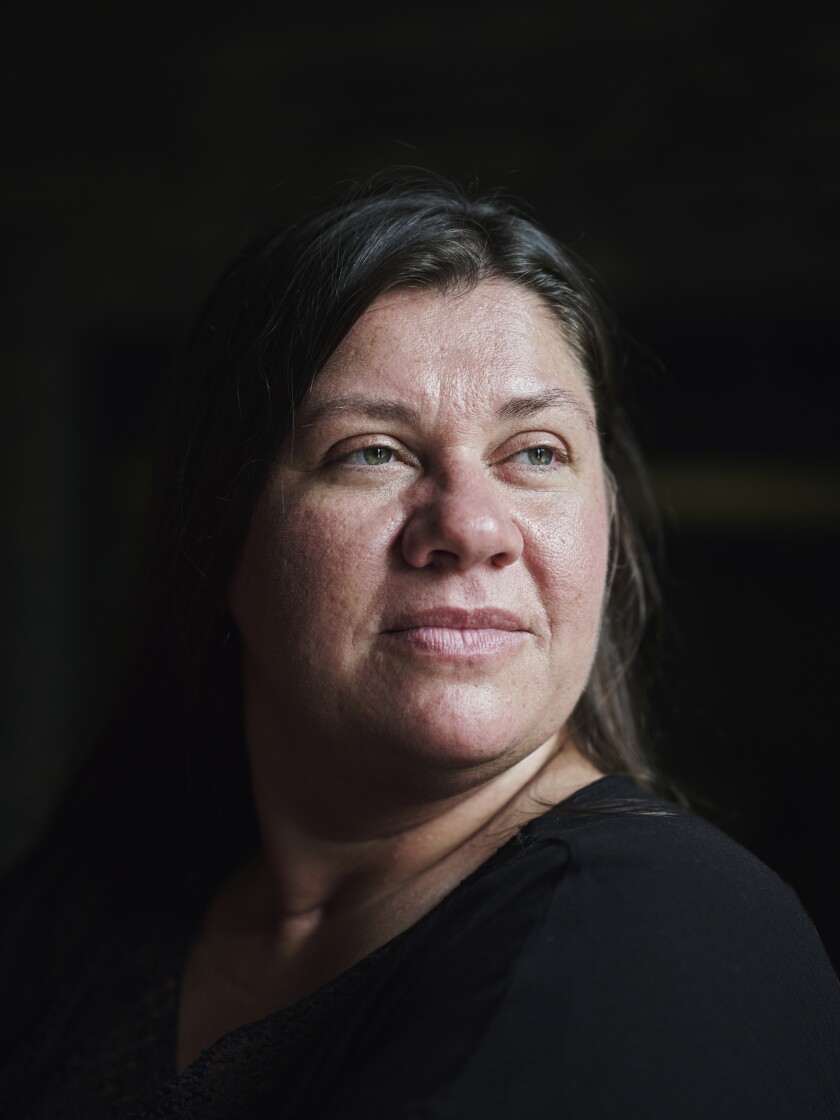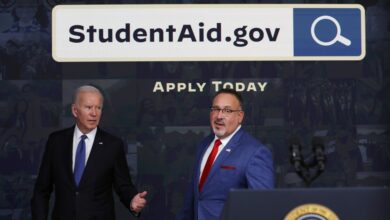An Adult Student’s Hard Lessons

“It’s a phoenix,” she says, rolling up the leg of her jeans to reveal a colorful bird that spreads its ornate wings up the curve of her left calf.
The new tattoo covers up a gecko — one she got ages ago that she no longer feels represents her journey. She chose a phoenix, she says, because “they always rise up.”
Raised as a peripatetic military brat, Mitchell, 43, has rebounded from a drug charge, a near-fatal bout of pneumonia, and a brush with MRSA after spinal surgery.
Now, after a series of what she describes as low-paying, dead-end jobs, Mitchell is in her second semester as a business student at Roane State Community College, about an hour northwest of Knoxville, Tenn., and works full-time at DWK Life Sciences, a medical-glass factory in nearby Rockwood, where she mindlessly pops corks into vials 12 hours a day.
By local standards, it’s pretty good pay — at $15 an hour, it’s definitely a step up from her last job working at a local supermarket, where she started at $11.25 an hour.
“I don’t do without,” she says. “I don’t starve.”
But she hates her job. “I don’t think that I’m too good for it or anything,” she says. “I just know that if I was to do that for the rest of my life, it would be a waste. Because I am smart. I don’t mean that to sound conceited. But I’m just capable of so much more.”
Mitchell is one of more than 39 million Americans with some college credit but nothing to show for it, locked out of a burgeoning number of jobs that require a degree or workforce credential.
Enrollment at community and technical colleges has been sliding for more than a decade, down about a million students overall from a peak enrollment of more than 8 million in 2010, when a strong economy began to lure more college-going students into the workforce. The Covid-19 pandemic sidelined many service industry workers without degrees, but, as the country began to recover, so did the job market, with demand for workers driving wage growth at an unprecedented rate. Two-year institutions lost on average 15 percent of their enrollment between the fall of 2019 and 2021, according to data compiled by the National Student Clearinghouse Research Center, with some colleges losing as much as 25 percent of their enrollment.
But boom times don’t last. Postsecondary degrees and workforce credentials still offer more reliable paths to long-term, stable employment with good pay. And for those who are first-generation college students or coming from impoverished families, finding those paths — and staying on them — is never easy.
Mitchell first attempted to earn a degree nearly two decades ago and has since been on a meandering journey that has involved several romantic relationships, raising a child, menial employment, personal mistakes, a misunderstanding with one college that led to nearly $10,000 in student-loan debt, and a new, state-funded start with another.
In some ways, her path to an education is relatively easy compared to many others — she now attends classes free of charge, for example.
But her story illustrates the myriad challenges millions of nontraditional students face in making their dreams come true and community-college administrators have getting them into, and through, school.
She didn’t head straight to college after high school. She thought about the Army, but her mother talked her out of it. She worked as a waitress. Sometimes she didn’t work. “Jobs were a dime a dozen,” she says. “You get mad at work. You just think, I’m done. I’ll find another job in a few days.” But the jobs didn’t pay much and offered little future.
In 2002, when she was 23, Mitchell gave birth to a daughter, Elaina, and followed Elaina’s father out to California, but the relationship didn’t work out. Within a few months, she was back in Rockwood and ready for a new start. She enrolled at Roane State intending to study psychology. After her own youthful turmoil, she thought, “maybe I could help somebody, prevent them from getting in trouble and help them work through their stuff.”
The first semester went fine. She was working, had Elaina in daycare, and somehow managed. By the second semester, however, “it was just too much,” she says. “I was still a kid. I hadn’t grown up yet.” She stopped attending classes and didn’t go back for another 18 years.
Mitchell raised her daughter. She got married and divorced. She got a job as a guard at the Morgan County Correctional Complex in nearby Wartburg, another low-paying job that she hated. She knew she needed a change in her life, but she didn’t know how to make it happen.
I just know that if I was to do that for the rest of my life, it would be a waste. Because I am smart. I don’t mean that to sound conceited. But I’m just capable of so much more.
South is a for-profit college owned by Education Management Corporation, which experienced financial difficulties during the 2010s. South was placed on probation in 2017 by the Southern Association of Colleges and Schools Commission on Colleges, its accreditor, over “financial concerns.” It was soon sold to Dream Center Education Holdings and converted to nonprofit status.
South’s recruiter talked Mitchell through filling out an application and financial-aid forms, and in the fall of 2020, Mitchell enrolled at South University.
She remembers being drawn to the promise of attending school online — she could take classes from home while she continued to work — but, she says, she cautioned the recruiter during their conversations that she had little money to put toward paying for college: “I thought that I was applying for grants and scholarships or whatever, because I specifically remember I asked several times, ‘What’s this going to cost me out of pocket?’”
In the middle of her first semester at South, she received a nasty surprise: a letter from a loan servicer stating that she was already on the hook for $9,500 in student loans. Finding out that she had incurred the unexpected debt horrified her. She’s sure she must have signed the papers authorizing it, she says, but “everything was being thrown at me so quickly that I didn’t really even have time to comprehend what was going on.”
Colleges that operate on a for-profit model have a history of applying “the hard sell” to students in order to enroll them, says Stephen Burd, a senior writer and editor for education policy at New America, a nonprofit policy group, where Burd has written extensively about the for-profit sector of higher education. A for-profit recruiter’s job, typically, is to get as many students as possible signed up as fast as possible, says Burd, a former Chronicle reporter. In a case like Mitchell’s, “the less she asked specifically, the less they’re going to volunteer.”
Representatives from South University did not respond to emails and voicemail messages requesting comment.
While Mitchell feels betrayed by the South recruiter, she ultimately blames herself. “This lady that I’m talking to, she seemed so friendly, and I trusted her to lead me, to help me better myself,” she says. “And I didn’t ask questions, I just filled out the information they told me to fill out.”
Money was a constant worry for Mitchell, so much so that she began to deal weed. But she was caught in spring 2020, which led to her losing her job as a corrections officer and ultimately being charged with felony possession.

William DeShazer for The Chronicle
She had never been in trouble with the law and calls her actions “a horrible mistake.” She wipes the corners of her eyes as she relates the shame she felt, which, she says, was amplified in a close-knit town like Harriman, population around 6,000. Mitchell says she stayed home for weeks because she was afraid. “I might run into someone who knew me, that knew what I had done.”
Mitchell ultimately pleaded guilty and asked the judge not to send her to prison. “If I go to jail, everything that I’ve been trying to do with school and straighten out my life and make things better,” she says, “that’s going to ruin it.”
In June 2021, she was sentenced to three years of unsupervised probation, at the end of which she can petition to have her record expunged.
What got Mitchell through the worst moments, when she worried most that she’d wrecked her life, was taking classes at South.
“I was really depressed at the time,” she says. Though the loans had rattled her, college work “gave me something productive to do other than just lay in bed and watch TV. I’d already put in too much effort. I’ve got it in my head, and I’m doing this. I am determined.”
After hearing about her attempt to go back to college and her dissatisfaction with South, one of her coworkers suggested that she enroll at Roane State and take advantage of Tennessee Reconnect, a program that provides free-tuition benefits for older students already in the workforce.
While 47 states have free-college programs at some level, most of them focus exclusively on recent high-school graduates, which makes Tennessee Reconnect relatively rare. Since it began in 2013, it has enrolled nearly 108,000 students and helped cover more than $129 million in college costs.
Mitchell took her paperwork from South to administrators at Roane State, though she was wary of being misadvised, as she had been by South over the loans. “I said, ‘Please be straight up and honest with me,’” she says. “‘Don’t beat around the bush with me. I need to know exactly what to do, what I need to do, and what I can do.’”
Mitchell was admitted. The college, which has a transient student population, assigns all new students a success coach to be their one-stop point of contact for all questions they might have. Need to know what classes to take or how financial aid works? Contact your success coach. Need tutoring for a class or are unsure how to navigate a prickly instructor or are having a crisis at home that might jeopardize your attendance in class? Success coaches are supposed to be there for you then, too.
Mitchell’s coach is Stephanie Bishop, one of 16 Roane State success coaches who support around 2,800 first-year students. Bishop works with about 175 students each semester, about 10 to 15 percent of whom are 25 or older.
When Mitchell first arrived at Roane State, “she was a little apprehensive,” Bishop says, “because the other person that was her adviser at [South] steered her into something that maybe is not what she wanted, so it was a little bit hard at first to break through that barrier.”
Interpersonal and intergenerational barriers can be an issue for adult students, according to Bishop. While teenagers new to college are sometimes afraid to talk to professors if they need help, Bishop says, older students who have been in the workforce are more used to alerting supervisors to problems. On the other hand, in her experience, “adult students like to take things on themselves before they reach out for help,” she adds, which may delay an effective solution. Bishop is 26, and “sometimes it’s like, ‘Oh, what does this 20-something-year-old know?’”
Mitchell is “one of the first ones to ask me when it’s time to register, what she needs to do with her FAFSA, what she needs to do with Reconnect,” Bishop says. “We are always emailing, texting, and calling each other throughout the semester.”
Mitchell’s classes either meet once a week or asynchronously online. Her current work schedule at DWK calls for three 12-hour days on and three days off. She devotes one full day off to schoolwork, and sometimes she needs more. When she took statistics, she says, “some days, I would sit there for 12 hours a day on my computer, studying.”
But when she comes home from a 12-hour day, she isn’t good for much else, she says. “It’s time to eat, take a shower, and lay down.”
Mitchell was disappointed when she learned that some of her old Roane State credits and South University credits won’t apply toward her accounting degree.
But she was crushed to learn that the Fs she earned when she stopped showing up for classes in 2003 would be applied to her new grade point average, immediately dropping it from a 3.5 to failing range. She has since brought it up to a 2.0.
“I was a kid,” she says, a plaintive note rising in her voice. “I didn’t know that I had to withdraw.”
Mitchell found it hard to accept. “I’ve worked my ass off,” she says. “Then, because I made a mistake 20 years ago, you’re gonna hold it against me? No. Take that off. Show what I’m doing now.” She came close to dropping out all over again.
But a friend talked her down. “They’re like, ‘Don’t worry about your GPA too much. Just get your degree.”
Interpersonal and intergenerational barriers can be an issue for adult students.
Mitchell says she’s always done well in math classes and loves the meticulousness of working with figures. She wants to be a forensic accountant, but she faces a long road to reach even the first step of her dream.
She doubts she has the time or energy to take more than the minimum of two classes a semester to maintain her eligibility for Tennessee Reconnect. “More than that is just too much,” she says. It will still take her several years to earn her associate’s degree. She will then have to transfer to a four-year institution — probably Tennessee Tech University, an hour to the northwest in Cookeville — to complete a bachelor’s degree.
Once Mitchell graduates or transfers from Roane State, she will no longer be eligible for Tennessee Reconnect, which applies only to two-year institutions. She will have to find other ways to pay for college. Adding more money to the more than $9,000 she already owes in federal student loans worries her. “Before I’m done, I’m gonna incur even more,” she says.
Now Mitchell is doing OK financially. She owns her home, a trailer on a quarter acre of land. She has a car payment of about $300 a month, plus about $100 for car insurance, but says it’s manageable. She plans to move in with her boyfriend as soon as they get the fence around his backyard fixed so her six chihuahuas won’t escape. But if something unexpected happens, like her car breaks down, she says she might have trouble paying to have it fixed. And when the federal government reinstates student-loan payments, which could happen as soon as September, she worries what it could do to her finances. “Any extra bill’s always a strain when you live paycheck to paycheck,” she says.
She can probably get an entry-level job doing books for a small business or doing nonaccounting work at an accounting firm with her associate’s degree. She thinks it will take five years at least to complete her bachelor’s degree, at which point, hopefully, she will have completed the 120 hours of relevant coursework necessary to take the exam to become a certified public accountant. Forensic accounting is a career specialty that she could pursue from there.
Mitchell wants a college degree to get a better job and make more money, but it isn’t just about the job or the money. She wants a better life. She wants to not feel self-conscious when she tells someone where she works. She wants to take her first vacation in decades. She wants to “get out and live a little bit,” she says. “You can’t really do that without money these days. It’s just not possible.”
This story was produced as part of the Higher Education Media Fellowship at the Institute for Citizens & Scholars. The fellowship supports new reporting into issues related to postsecondary career and technical education.
Source link






